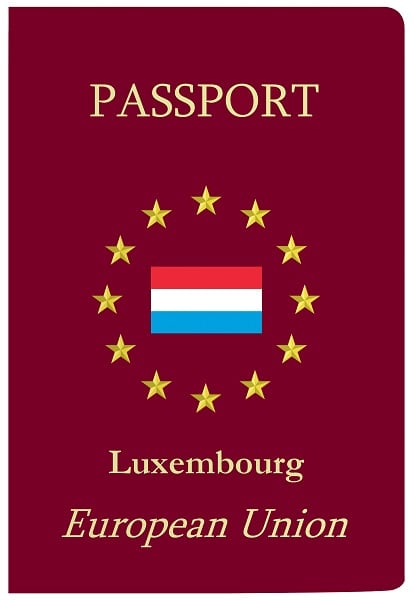Acquiring Luxembourg citizenship by naturalization confers on the foreigner the status of Luxembourg citizen, with all the rights and duties that this entails. Find out here how to obtain Luxembourg citizenship.
The Luxembourg passport, one of the most powerful
The Luxembourg passport allows visa-free travel to 187 countries worldwide. According to the Henley Passport Index, it is one of the most powerful passports in the world. Luxembourg is in third place, behind Japan and Singapore in a tie for first place, and Finland, Germany and South Korea in a tie for second.
Luxembourg Naturalization Act 2017
Since April 1, 2017, a new law authorizes residents in Luxembourg for at least 5 years to acquire Luxembourg nationality through naturalization, subject to certain conditions. Applicants are not obliged to renounce their original nationality due to the principle of dual nationality.
Since 2017, the residence requirement under the new law has been reduced from 7 years to 5 years in order to apply for Luxembourg nationality.
Who can apply for Luxembourg nationality?
Luxembourg nationality by option
Any person born in Luxembourg, aged 18 and over, automatically obtains Luxembourg nationality under the following conditions:
- she has lived and resided legally in Luxembourg for at least five consecutive years before reaching the age of majority
- one of its parents has lived in Luxembourg for at least twelve consecutive months immediately preceding its birth.
If these two conditions are met, a child born in Luxembourg can obtain nationality from the age of 12.
Acquiring Luxembourg nationality by option is possible in 10 specific cases:
- adult with a Luxembourg parent or grandparent
- parent whose minor child is from Luxembourg
- married to a Luxembourg citizen
- Luxembourg-born over 12 years of age
- adult having completed at least 7 years of schooling in Luxembourg
- an adult who has regularly lived in Luxembourg for more than 20 years
- adult who has complied with the commitments of the reception and integration contract
- adults living in Luxembourg before their 18th birthday
- adults with stateless, refugee or subsidiary protection status
- volunteer soldier.
Second-generation droit du sol remains in force in Luxembourg. A child born in Luxembourg, one of whose parents or adoptive parents was also born in the Grand Duchy, will automatically benefit from Luxembourg nationality.
Luxembourg nationality by naturalization
In addition to the above cases of recovery of Luxembourg nationality, any person who meets the conditions for naturalization may apply for Luxembourg nationality under the following conditions:
- be over 18 at the time of application
- have been legally resident in Luxembourg for more than 5 years and at least 1 year continuously at the time of submitting the application for naturalization
- meet the requirements of good character. In other words, the applicant must not have made false declarations, concealed material facts or defrauded the authorities in any way when applying for naturalization. He or she must also not have been convicted of any criminal offence or prison sentence of 12 months or more, or suspended sentence of 24 months or more.
Click here for our administrative guide to Luxembourg
Conditions for becoming a naturalized Luxembourg citizen
Have lived in Luxembourg for at least 5 years
To become a naturalized citizen of Luxembourg, you must have lived in the country for at least 5 years, and pass two major tests: a language test and a test of your knowledge of Luxembourg culture and customs.
Passing the Luxembourg language test
To qualify for Luxembourg nationality, applicants for Luxembourg naturalization must have passed the Luxembourg language assessment test.
This Luxembourg language exam is organized by the Institut National des Langues du Luxembourg . The exam consists of 2 separate tests: oral expression and oral comprehension. These tests take place over 2 days. Candidates must take part in both tests.
Speaking test in Luxembourgish
For oral expression, the level required for the exam is level A2 of the Common European Framework of Reference for Languages. This level corresponds to the ability to hold a basic conversation in Luxembourgish.
Candidates must be able to introduce themselves, ask for directions, shop in a store, ask for someone's news, etc.
The exam lasts about 15 minutes, during which the candidate must express himself in Lëtzebuergesch in front of two examiners, one in the role of moderator and the other in the role of observer. The exam consists of two distinct parts. The exam consists of two distinct parts.
For the first part, the candidate chooses one of the 2 subjects on offer. They must answer questions put by one of the examiners. For the second part, the candidate chooses one image from the three on offer. This image must be described.
Luxembourgish listening comprehension test
For the Luxembourgish listening comprehension test, candidates must demonstrate a B1 level. To do this, the candidate must be able to understand everyday subjects, at work, with friends, on the radio, etc. During the exam, which lasts around 25 minutes, the candidate listens to 3 different texts. Each time, they must answer multiple-choice questions. Correction is done by two examiners.
Candidates must obtain an average mark in the oral expression test to pass the language evaluation exam. If the candidate does not obtain an average mark in the oral test, the mark obtained in the listening comprehension test may be used to compensate.
Candidates receive their test results by post a fortnight after the last test.
Registration fees for the exam and the Luxembourg language course may be reimbursed by the State. On the other hand, if the candidate does not sit either of the exams, he or she will have to re-sit and pay the registration fee again.
Passing the "Living together in the Grand Duchy of Luxembourg" test
In order to obtain nationality or naturalization, candidates must also obtain a "Living together in Luxembourg" certificate in addition to the language test.
This certification is obtained by taking part in the civics course "Living together in the Grand Duchy of Luxembourg", organized by the Adult Education Department of the Ministry of National Education, Children and Youth. The courses are compulsory. Participants receive a certificate of attendance at the end of the course.
The "Living together in the Grand Duchy of Luxembourg" course consists of 3 modules for a total of 24 hours:
- Fundamental rights of citizens (6-hour module)
- Luxembourg's state and municipal institutions (12-hour module)
- The history of Luxembourg and European integration (6-hour module).
You can also take the "Vivre ensemble au Luxembourg" exam, having revised the various subjects yourself via the Vivre ensemble au Grand Duché website.
Persons having completed part of their schooling in Luxembourg
People who have completed at least 7 years of schooling inLuxembourg's public education system, or who have a residence permit and have been resident in Luxembourg since December 31, 1984, are exempt from the requirement to have their spoken Luxembourgish language assessed, and from the civics course,
Access to registration forms for the Living together in Luxembourg course
How do I apply for Luxembourg nationality?
Before submitting the naturalization application form, the applicant must have passed the language tests and completed the civics course (see above).
The applicant must submit a dated and signed application for naturalization to the Minister of Justice.
Please note that all documents must be submitted to the commune of your place of residence.
For information on the right to Luxembourg nationality, please contact the Infoline Nationalité of the Ministry of Justice:
- from Luxembourg, call 8002 1000 (toll-free number), and,
- from abroad, call +352 247-885 88.
The infoline can be reached Monday to Friday from 8.30 to 12.00 and from 13.30 to 17.00.
Under certain conditions, costs incurred (with a ceiling) in acquiring Luxembourg nationality may be reimbursed. Applications must be made to the Ministry of Justice, Service de l'Indigénat.
For other integration-related topics, visit our "Integration" pages.
Luxembourg nationality confers the right and obligation to vote in Luxembourg elections.
The principle of dual nationality
Since January 1, 2009, it has been possible to acquire Luxembourg nationality while retaining one's original nationality. This is the principle of dual nationality.
However, while Luxembourg accepts the principle of dual nationality, this is not the case in all countries. It is possible that the country of origin of the applicant for Luxembourg nationality does not apply this principle. It is up to the applicant to check with the authorities of the country of which he or she is already a national.
Luxembourg nationality application statistics
The 2017 law as well as the Brexit have had a not inconsiderable effect on applications for Luxembourg nationality. In 2019, as in 2018, over 11,000 applications were processed each year, compared with just over 9,000 in 2017. In 2020, almost 9,400 people benefited from Luxembourg nationality, 6,800 in 2021 and almost 10,500 in 2022.
Brazilians were the first to benefit, with 3,275 having obtained Luxembourg nationality by 2022. The Portuguese were second, with 1,227 new Luxembourg citizens. The French were the third largest beneficiaries, with almost 1,191 new Luxembourg citizens.
Some have also benefited from the Law introduced in 2009, enabling them to benefit from nationality if a grandparent was himself or herself Luxembourgish on January 1, 1900.
Overall, and as a result, the proportion of foreigners in Luxembourg' s overall resident population is declining.
Silver partner








